- Home
- Jerry B. Jenkins
Mark's Story Page 14
Mark's Story Read online
Page 14
It seemed to Mark to take forever for the apostles and elders to agree to a large meeting regarding the Jewish-Gentile question. He and Peter had been traveling and ministering together for years, and it took more than fifteen years after the death, burial, and resurrection of Christ for a council of all parties to be convened in Jerusalem.
According to Peter, certain disciples of James—the brother of Jesus and the ruling elder of the church in Jerusalem—had gone to the church at Antioch and taught the brethren that unless they were circumcised according to the custom of Moses, they could not be saved. Mark naturally found Peter extremely vexed over this.
“I know better, because God has shown me. He called us to preach first to Israel, but when His own chosen people rejected Him, He sent us into all the world to preach the gospel to everyone.”
“But you, like me, Peter, can at least understand the dilemma of the Judaizers.”
“Of course I can! Like you, like all the disciples, I was raised a Jew. The laws of Moses have dominated my life. I was circumcised, and I followed all the rules and traditions. That’s why it was such a revelation to me when the Spirit led me into the home of an actual Gentile, Cornelius, and further gave me utterance to lead him to faith in Christ. How dare these men make an abomination of the free gift of salvation, offered to all who believe?”
Word came that Paul and Barnabas had vigorously disputed the Jerusalem representatives, and based on Peter’s letter and the insistence of James’s disciples, it was determined that the two leaders in Antioch and certain others of them should go to Jerusalem and meet with the council of apostles and elders to settle the matter.
Mark had longed to return home and see his now frail mother. Old and infirm as she was, still she supervised the servants and hosted the Jerusalem Council in her upper room. Mark did not consider himself in any respect equal to the apostles and elders, and thus felt privileged just to be there. Paul and Mark’s cousin greeted him, Barnabas perhaps a bit more warmly than Paul. But at one point Mark noticed that Peter and Paul quickly quieted as he passed by, and later Peter admitted he had been trying to disabuse Paul of his negative opinion of Mark.
The rare occasion of the council spurred talk on many subjects and doctrines, but of course the primary one concerned the obligation of Gentile believers in Christ. Barnabas and Paul were called upon to bring a report, and after Barnabas gave a general and encouraging update on the church at Antioch, Paul took the floor.
“We were generously sent here by the body of believers,” he said, “and as we passed through Phoenicia and Samaria, we told of the widespread conversion of the Gentiles. This caused a great outpouring of joy from all the brethren. We most appreciate being received by the church here, especially by you apostles and the elders, and I ask that you bear with me as I tell you of many new Gentile converts.”
Paul held forth for several minutes, telling thrilling stories of conversions—including that of Titus, who was one who had accompanied him and Barnabas. But soon Paul was interrupted by some of the sect of the Pharisees who believed in Jesus. They rose up, saying, “Paul, it is necessary for you and Barnabas to circumcise these new believers and to command them to keep the law of Moses.”
Paul responded angrily and Barnabas tried to be more conciliatory. But the more the two sides argued, the louder the discussion became. Finally Peter stood, and Mark was proud to see that he still enjoyed deep respect and deference from all. They sat and quieted themselves.
“Men and brethren,” he said, “you know that a good while ago God chose among us, that by my mouth the Gentiles should hear the word of the gospel and believe. So God, who knows the heart, acknowledged them by giving them the Holy Spirit, just as He did to us, and made no distinction between us and them, purifying their hearts by faith.
“Now therefore, why do you test God by putting a yoke on the neck of the disciples which neither our fathers nor we were able to bear? But we believe that through the grace of the Lord Jesus Christ we shall be saved in the same manner as they. Now please, remain silent and listen to Barnabas and Paul declaring how many miracles and wonders God has worked through them among the Gentiles.”
Barnabas and Paul related more stories, and when they had finished, James said, “Men and brethren, listen to me: Simon has declared how God at the first visited the Gentiles to take out of them a people for His name. And with this the words of the prophets agree, just as it is written: ‘After this I will return and will rebuild the tabernacle of David, which has fallen down; I will rebuild its ruins, and I will set it up; So that the rest of mankind may seek the Lord, even all the Gentiles who are called by My name, says the Lord who does all these things.’
“Known to God from eternity are all His works. Therefore I judge that we should not trouble those from among the Gentiles who are turning to God, but that we write to them to abstain from things polluted by idols, from sexual immorality, from things strangled, and from blood.
“For Moses has had throughout many generations those who preach him in every city, being read in the synagogues every Sabbath.”
The council then decided to send chosen men of their own company to Antioch with Paul and Barnabas to inform Gentile believers in Antioch, Syria, and Cilicia of what they had decided: that they need not be circumcised or subject to the whole law of Moses, but “since we have heard that some who went out from us have troubled you with words, unsettling your souls, saying, ‘You must be circumcised and keep the law’—to whom we gave no such commandment—it seemed good to us, being assembled with one accord, to send chosen men to you with our beloved Barnabas and Paul, men who have risked their lives for the name of our Lord Jesus Christ.
“We have therefore sent Judas and Silas, who will also report the same things by word of mouth. For it seemed good to the Holy Spirit, and to us, to lay upon you no greater burden than these necessary things: that you abstain from things offered to idols, from blood, from things strangled, and from sexual immorality. If you keep yourselves from these, you will do well. Farewell.”
Word soon came to Mark and to Peter that when Paul and Barnabas and the others had gathered the multitude together at Antioch and read the letter, all rejoiced over its encouragement. In a letter to Mark, Barnabas reported that Judas and Silas, themselves being prophets, also exhorted and strengthened the brethren. And after they had stayed there for a time, they were sent back with greetings from the brethren to the apostles. “Paul and I also remained here,” Barnabas wrote, “teaching and preaching the word of the Lord, with many others also. Recently Paul suggested to me, ‘Let us now go back and visit our brethren in every city where we have preached the word of the Lord, and see how they are doing.’
“Mark, I told Paul that you should be invited to join us, but he insisted that we should not take with us one who had departed from us in Pamphylia and had not gone on with us to the work. I know that Peter spoke highly of you to Paul in Jerusalem, and so I persisted, but Paul was adamant. Sad to say, the contention became so sharp that we have parted from each other. I need you to sail with me to Cyprus, as Paul has chosen Silas and departed, being commended by the brethren to the grace of God to go through Syria and Cilicia, strengthening the churches. Would you come?”
Peter gave his blessing for Mark to join his cousin, then traveled with Mark as far as Antioch, where Peter would minister for a time in the absence of Paul and Barnabas and Silas. On that journey to Antioch, Mark beseeched Peter to tell more of his time with Jesus.
“We did have a most telling discussion one day. As we followed Him to the towns of Caesarea Philippi, on the road He said, ‘Who do men say that I am?’
“We told Him, ‘John the Baptist; but some say, Elijah; and others, one of the prophets.’
“He said, ‘But who do you say that I am?’”
“He asked that straight out?”
“He did, and I quickly said, ‘You are the Christ.’ He looked at me knowingly, and I was certain I had spoken for us all. He strictly w
arned us that we should tell no one about Him.”
“Why?”
“The people would have forced Him to become their king and to throw off the shackles of Rome. But that was not what He was about. He began to teach us that the Son of Man must suffer many things, and be rejected by the elders and chief priests and scribes, and be killed, and after three days rise again. He said all this openly to the point where I took Him aside and rebuked Him. But He turned around and looked at the other disciples, rebuking me and saying, ‘Get behind Me, Satan! For you are not mindful of the things of God, but the things of men.’
“You can only imagine my humiliation. My motive had been pure. I loved Him. But I could not fathom His leaving us, especially by dying. But the next time He spoke to the multitudes, He said, ‘Whoever desires to come after Me, let him deny himself, and take up his cross, and follow Me. For whoever desires to save his life will lose it, but whoever loses his life for My sake and the gospel’s will save it. For what will it profit a man if he gains the whole world, and loses his own soul? Or what will a man give in exchange for his soul? For whoever is ashamed of Me and My words in this adulterous and sinful generation, of him the Son of Man also will be ashamed when He comes in the glory of His Father with the holy angels.’
“Did you understand all of this?”
“Not all. But I gathered that He was comparing this worldly life to the eternality of the soul. He confided to the twelve of us that ‘there are some standing here who will not taste death till they see the kingdom of God present with power.’ Mark, I was among those He was referring to, despite that He had just compared me to Satan. James and John were also with Him to see the kingdom of God present with power.”
“What did he mean? You will not die until He returns again?”
“Oh, no, I did not take it that way at all, for He made clear that no man knows the day or the hour of His coming. If He made clear it was to happen in my lifetime, that would contradict His assertion that not even He knows when He’s coming, but only the Father.”
“Then what was he saying, Peter?”
“I believe when He referred to the kingdom of God sent with power he meant the great outpouring of the Holy Spirit at the time of Pentecost. Six days later Jesus took the three of us and led us up on a high mountain, where He was transfigured before us. His clothes shone exceedingly white like snow, such as no launderer on earth could whiten them. And suddenly there stood Elijah with Moses, and they talked with Jesus.”
“You must have been terrified! What was happening to Him?”
“Oh, I was! We all were. Greatly afraid and not knowing what else to say, I said, ‘Rabbi, it is good for us to be here; and let us make three tabernacles: one for You, one for Moses, and one for Elijah.’
“A cloud came and overshadowed us, and a voice came out of the cloud, saying, ‘This is My beloved Son. Hear Him!’ Suddenly, when we looked around, we saw no one anymore but Jesus.”
“So these were spirits? Ghosts?”
“I believe they were the saints themselves, Mark.”
“And you have no doubt you heard the voice of God from a cloud?”
“That is something one does neither mistake nor forget. As we came down from the mountain, Jesus commanded that we should tell no one what we had seen, till the Son of Man had risen from the dead. We kept this word ourselves, but we wondered what He meant about rising from the dead.
“We asked Him, ‘Why do the scribes say that Elijah must come first?’
“He said, ‘Indeed, Elijah is coming first and restores all things. And how is it written concerning the Son of Man, that He must suffer many things and be treated with contempt? But I say to you that Elijah has also come, and they did to him whatever they wished, as it is written of him.’”
“I’m terribly confused. Were you?”
“For a time, yes. But we concluded that He was speaking of John the Baptizer having come in the spirit and power of Elijah. And he was put to death, just as the prophets foretold.
“When we rejoined the other disciples, Jesus saw a great multitude around them and scribes disputing with them. Immediately, when they saw Him, all the people were greatly amazed, and ran to Him, greeting Him.
“He asked the scribes, ‘What are you discussing with them?’
“One from the crowd said, ‘Teacher, I brought You my son, who has a mute spirit. And wherever it seizes him, it throws him down; he foams at the mouth, gnashes his teeth, and becomes rigid. So I spoke to Your disciples, that they should cast it out, but they could not.’
“Jesus looked terribly disappointed in the other nine disciples, not to mention the father of the mute boy and the scribes who were there only to test Him. He said, ‘O faithless generation, how long shall I be with you? How long shall I bear with you? Bring him to Me.’
“As soon as the spirit saw Jesus, it convulsed the boy and he fell, foaming at the mouth.
“Jesus asked the boy’s father, ‘How long has this been happening to him?’
“‘From childhood,’ he said. ‘And often he has thrown him both into the fire and into the water to destroy him. But if You can do anything, have compassion on us and help us.’
“Jesus said, ‘If you can believe, all things are possible to him who believes.’
“Immediately the father cried out with tears, ‘Lord, I believe; help my unbelief!’”
“An honest, human man,” Mark said.
“Oh, yes. And when Jesus saw more people come running, He said, ‘Deaf and dumb spirit, I command you, come out of him and enter him no more!’
“Then the spirit cried out, convulsed the boy greatly, and came out of him. The boy lay there so still that many said, ‘He is dead.’ But Jesus took him by the hand and lifted him, and he arose.”
“Why could not the other disciples cast out the demon?” Mark said.
“That’s what they asked Jesus privately. He said, ‘This kind can come out by nothing but prayer and fasting.’
“We departed from there and passed through Galilee, but He did not want anyone to know He was there. He told us, ‘The Son of Man is being betrayed into the hands of men, and they will kill Him. And after He is killed, He will rise the third day.’
“Mark, we had no idea what He meant, and not one of us had the courage to ask.”
As always, Mark marveled at the stories of the Master, but he was struck anew with the tragedy it would have been had the gospel of the kingdom been kept from the Gentiles. This would prove an endless debate among the faithful, but Mark was confident that he knew the mind of God on the matter, even if his understanding was based solely on Peter’s story of Cornelius.
NINETEEN
As Mark and his beloved mentor drew within a day’s journey from Antioch, Mark’s eager anticipation of traveling again with his cousin was tempered only by his disappointment that there was so much more he yearned to hear from Peter about Jesus. Mark was in his forties by now, and Peter much older. Mark only hoped they would reunite someday and have time to finish the entire story. He still believed he could talk the old man into getting it all written.
On that final day of travel, Peter reminisced more about his time with the Master.
“Knowing how resolute Jesus was that no one should know He was in the area, my wife and I hosted Him at our home in Capernaum. Once we were safely inside, and the rest of the disciples with us, He did one of those frequently disconcerting things He was known for. He said, ‘What was it you disputed among yourselves on the road?’
“None of us dared say, Mark, because we were so ashamed. I don’t see the danger of this in you, but this may be instructive nonetheless for the next step in your ministry life. You see, we had been disputing among ourselves who was the greatest.”
“Besides Jesus, you mean.”
“Yes, sadly. Just among us. Now you know He was not much older than we were, except for John who was nearly ten years His junior. But Jesus was so wise that He often treated us as His children, which we, of
course, were. He sat and called us about Him, and when we had settled at His feet, He said, ‘If anyone desires to be first, he shall be last of all and servant of all.’
“Just as we were wondering what He meant, one of my little nephews toddled into the room and headed directly for Jesus. Children always seemed drawn to Him. Jesus took him in His arms in the midst of us and said, ‘Whoever receives one of these little children in My name receives Me; and whoever receives Me, receives not Me but Him who sent Me.’
“John said, ‘Teacher, we saw someone who does not follow us casting out demons in Your name, and we forbade him because he does not follow us.’
“But Jesus said, ‘Do not forbid him, for no one who works a miracle in My name can soon afterward speak evil of Me. For he who is not against us is on our side. For whoever gives you a cup of water to drink in My name, because you belong to Christ, assuredly, I say to you, he will by no means lose his reward.
“‘But whoever causes one of these little ones who believe in Me to stumble, it would be better for him if a millstone were hung around his neck, and he were thrown into the sea. If your hand causes you to sin, cut it off. It is better for you to enter into life maimed, rather than having two hands, to go to hell, into the fire that shall never be quenched—where “Their worm does not die and the fire is not quenched.”
“‘And if your foot causes you to sin, cut it off. It is better for you to enter life lame, rather than having two feet, to be cast into hell, into the fire that shall never be quenched—where “Their worm does not die and the fire is not quenched.”
“‘And if your eye causes you to sin, pluck it out. It is better for you to enter the kingdom of God with one eye, rather than having two eyes, to be cast into hell fire—where “Their worm does not die and the fire is not quenched.”
“‘For everyone will be seasoned with fire, and every sacrifice will be seasoned with salt. Salt is good, but if the salt loses its flavor, how will you season it? Have salt in yourselves, and have peace with one another.’”

 The Betrayal
The Betrayal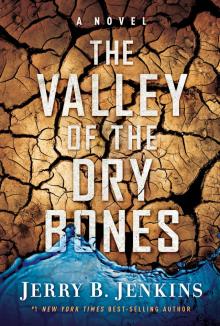 The Valley of Dry Bones
The Valley of Dry Bones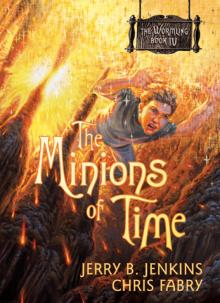 The Minions of Time
The Minions of Time Wild Rescue
Wild Rescue Though None Go with Me
Though None Go with Me Hometown Legend
Hometown Legend The Breakthrough
The Breakthrough The Youngest Hero
The Youngest Hero Nicolae High
Nicolae High Through the Flames
Through the Flames The Brotherhood
The Brotherhood Grave Shadows
Grave Shadows The Changeling
The Changeling Shadowed
Shadowed Precinct 11 - 01 - The Brotherhood
Precinct 11 - 01 - The Brotherhood Second Chance
Second Chance Silenced
Silenced The Vanishings
The Vanishings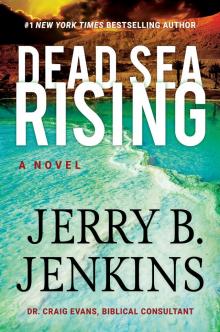 Dead Sea Rising
Dead Sea Rising Soon
Soon The Author's Blood
The Author's Blood The Sword of the Wormling
The Sword of the Wormling Left Behind - The Kids 02 - Second Chance
Left Behind - The Kids 02 - Second Chance Haunted Waters
Haunted Waters The Underground
The Underground Mark's Story
Mark's Story Shaken
Shaken Deceived
Deceived Frantic
Frantic Riven
Riven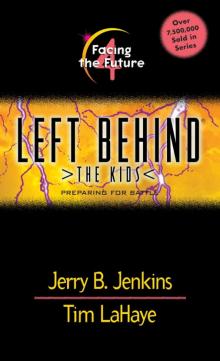 Facing the Future
Facing the Future Stung
Stung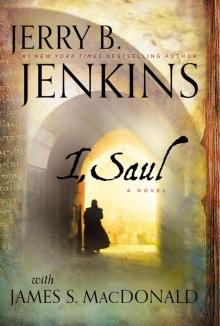 I, Saul
I, Saul Hunted
Hunted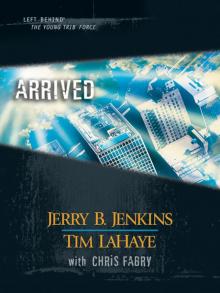 Arrived
Arrived John's Story
John's Story Stolen Secrets
Stolen Secrets